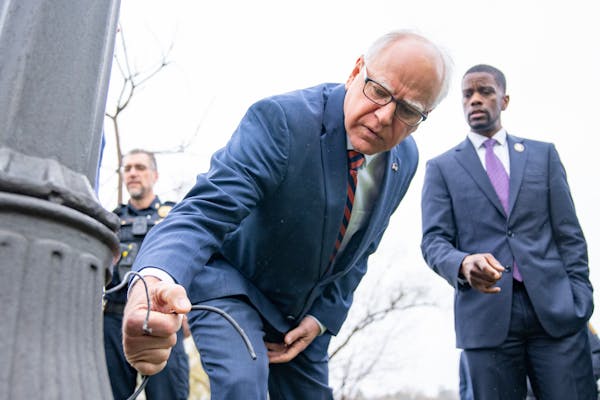First District: Tim Walz Democratic incumbent Tim Walz has earned a return trip to the U.S. House after an energetic first term focused on high-profile issues in his southern Minnesota district -- agriculture, veterans' affairs and renewable energy. Walz's work on recent farm bills was smart and practical -- measures that aided beginning farmers and streamlined paperwork for established operators. Walz, who served in the National Guard for 24 years, also helped pass much-needed funding increases for veterans' health care and benefits. Veterans across the district praise his work, often saying he is "one of us."
On the Wall Street bailout, Walz differed with the Editorial Board, which supported Treasury Secretary Hank Paulson's plan. But unlike other politicians, Walz actually offered solutions instead of simply criticizing it, working with colleagues in both parties to come up with an alternative plan that offered more protection to taxpayers and homeowners. In contrast, the position taken on the bailout by Walz's Republican challenger, Mayo Clinic physician Dr. Brian Davis, seemed rooted in ideology and the politics of blame.
Davis, a cancer radiation specialist at the Rochester medical center, is an intelligent, informed candidate. He's a bona fide conservative whose main campaign message is that Walz is too liberal for the district. But Davis has not made the case that he's a better fit. His responses on veterans' issues have not connected. His overemphasis on fossil fuel development is shortsighted and overlooks the economic potential of the region's abundant wind energy. His years as a physician apparently haven't inspired passion for fixing the nation's health care system or deep insights. His standard-issue proposals contrast unfavorably with the fiery expertise of his boss, Mayo CEO Dr. Denis Cortese, who campaigned nationally this year for systemic overhaul.
The Independence Party's Greg Mikkelson is also campaigning for this seat. Mikkelson, a Lake Crystal farmer, has put considerable time into his policy proposals. But it's difficult to see him as a serious candidate because he's run multiple times for different parties and doesn't even have a website.
Walz has also won support across the district for staying in touch. Voters often cite his willingness to show up for local meetings or his attention to regional projects: helping get water lines out to a Worthington business park, for example. Walz is an accomplished, trusted representative, well deserving of a second term.
Second District: John Kline Republican Rep. John Kline has significant differences with the Editorial Board on some important issues. His absolutist position on earmarks is a concern, likely making it more difficult to complete transportation projects in his district. There's also room for improvement on veterans' issues and the environment. The moderate Republicans for Environmental Protection gave Kline a zero on its most recent congressional vote scorecard.
But recently, the three-term congressman faced a tough and revealing test of leadership. He passed, a key reason he merits endorsement. The test? Voting on the Wall Street bailout bill.
The anguish of that decision still could be seen on Kline's face during a recent interview, when he recounted the tense days on Capitol Hill as Treasury Secretary Hank Paulson warned of economic Armageddon. At the same time, angry voters swamped his office demanding a no vote. Kline began working the phones, listening to bankers, business owners and economists in the Twin Cities and elsewhere. When it came time to vote, he did what he thought was right for the country instead of what was politically expedient. He voted yes. That's leadership.
Kline is a thoughtful conservative -- one who has become far less of an ideologue during his three terms in office. When the retired Marine colonel first ran for his House seat, he hewed too closely to talking points and his ramrod image as the guy who carried the "nuclear football" briefcase for President Ronald Reagan. Over the years, he's become a multidimensional politician, displaying easy fluency on a wide range of issues. He's also developed a reputation for collegiality on Capitol Hill and in his district, suggesting an openness to new ideas and a willingness to listen. That's a valuable quality in an era where partisanship has blocked much-needed progress.
With Democrats expected to pick up House seats this election, Kline will provide needed balance in the House. His calls for fiscal responsibility will be particularly welcome. Also valuable is Kline's level-headed approach to foreign policy. Throughout this election, Kline has stressed the role of diplomacy and the power of economic sanctions. Kline's support for turning a pioneering Minnesota soldier reintegration project into a national program is also praiseworthy and garnered him an award from the National Guard.
Kline's challenger, Democrat Steve Sarvi, easily is one of the most outstanding political newcomers this year. A former mayor of Watertown and an Iraq veteran, Sarvi is a fresh face on the political scene. His service in Iraq gives him considerable depth as a candidate. In a televised debate with Kline, Sarvi held his own on foreign policy. He's also passionate and well-informed on veterans' issues.
If this were an open seat, Sarvi may well have garnered the Editorial Board's endorsement. But Kline's expertise, seniority and growing clout -- he's the ranking member on an influential Education and Labor subcommittee -- make him the strongest contender.
(Coming Tuesday: Endorsements in the Third and Sixth Districts.)
